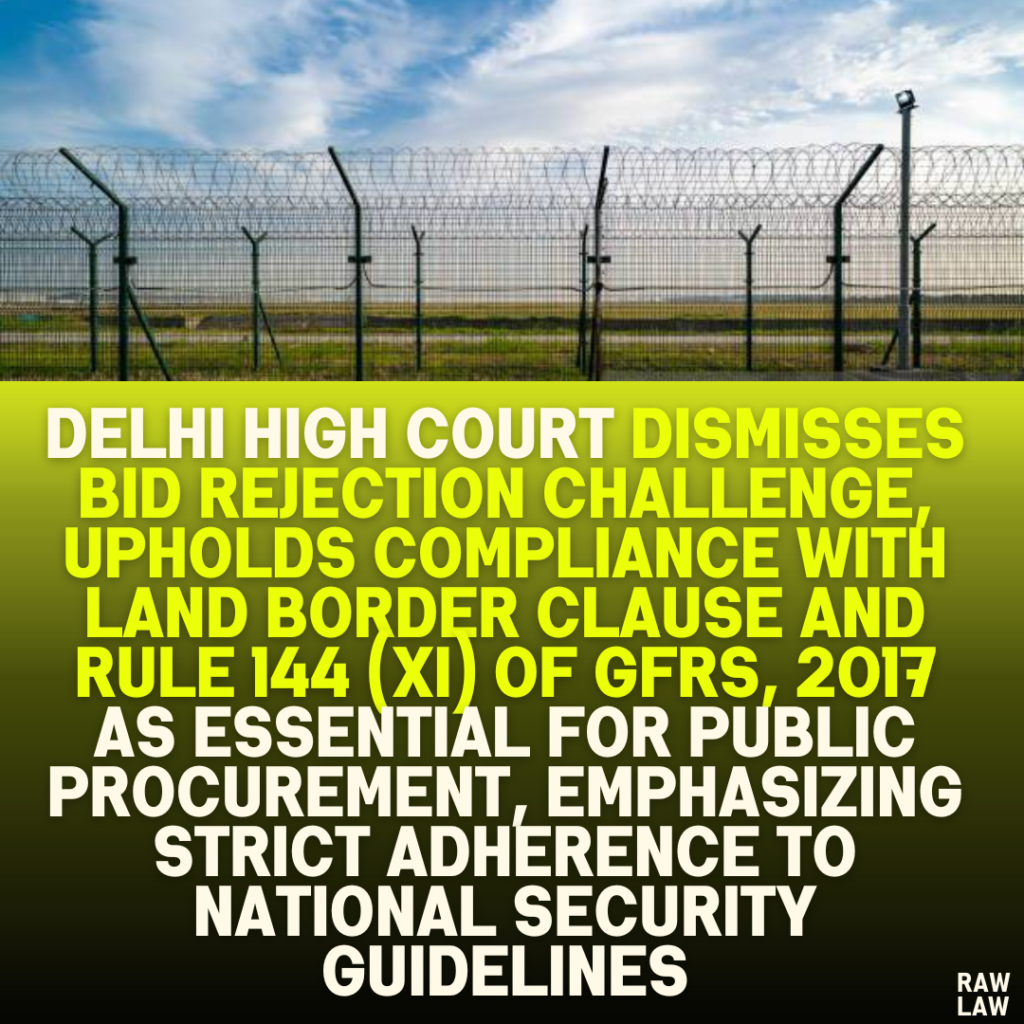Court’s Decision
The Delhi High Court dismissed the petitioner’s challenge against the rejection of their bid. The rejection was based on the petitioner’s alleged failure to comply with public procurement guidelines, specifically those applying to bidders associated with entities from countries sharing land borders with India. The Court upheld the respondent’s actions, emphasizing the importance of adhering to public procurement rules designed to safeguard national interest.
Facts
- The petitioner, a private company importing diagnostic kits for testing diseases like HIV, Hepatitis B, and Hepatitis C, submitted a bid under a tender issued by HLL Infra Tech Services Ltd.
- The tender required compliance with Clause 5 of the tender document and Rule 144 (xi) of the General Financial Rules (GFRs), 2017, which set conditions for bidders from countries sharing land borders with India.
- The petitioner provided a Manufacturer’s Authorization Form (MAF) from Grifols (HK) Ltd., a Hong Kong-based company, which stated that the petitioner was authorized to supply products manufactured in the USA and Switzerland.
- The bid was rejected on the grounds of “non-compliance with the land border clause,” as Hong Kong shares a land border with India, and neither Grifols (HK) Ltd. nor the petitioner was registered with the competent authority as required.
Issues
- Whether the petitioner acted as an agent of Grifols (HK) Ltd., which shares a land border with India.
- Whether the rejection of the petitioner’s bid was justified under Clause 5 of the tender and Rule 144 (xi) of the GFRs, 2017.
Petitioner’s Arguments
- Compliance with Rules: The petitioner argued that the products were manufactured in the USA and Switzerland, and thus, the land border restrictions should not apply.
- Role of Grifols (HK) Ltd.: It was claimed that Grifols (HK) Ltd. only provided administrative support for Grifols Diagnostics USA, and the petitioner was not its agent but acted independently.
- Clarifications Provided: The petitioner stated that clarifications were submitted, explaining their compliance with the tender terms. These clarifications were ignored by the respondents.
- Request for Reconsideration: The petitioner sought to have their bid reconsidered, alleging that the rejection was arbitrary and unfair.
Respondent’s Arguments
- MAF Established Agency Relationship: The respondents highlighted that the Manufacturer’s Authorization Form (MAF) submitted by Grifols (HK) Ltd. clearly established it as a manufacturer and identified the petitioner as its agent.
- Violation of Rules: The respondents argued that Grifols (HK) Ltd., situated in Hong Kong, is a company from a country sharing a land border with India. As neither Grifols (HK) Ltd. nor the petitioner was registered with the competent authority, the bid was rightly rejected.
- No Weight to Clarifications: The clarifications provided by the petitioner were termed “self-serving” and inconsistent with the documentary evidence, particularly the MAF.
- Reliance on Precedent: The respondents relied on the ruling in Wipro GE Healthcare Pvt. Ltd. vs. Union of India, which dealt with similar facts, to support their decision to reject the bid.
Analysis of the Law
- Rule 144 (xi) of GFRs, 2017: This rule restricts participation in tenders by bidders associated with entities from countries sharing land borders with India unless registered with the competent authority.
- Clause 5 of the Tender Document: This clause incorporated Rule 144 (xi), requiring compliance with restrictions on bidders from land-border-sharing countries.
- Definitions of “Bidder” and “Agent”:
- A bidder includes Indian agents of entities from countries sharing land borders with India.
- An agent is defined as a person representing another in dealings with third parties.
- Based on the MAF, the Court found the petitioner to be an agent of Grifols (HK) Ltd., disqualifying them under the rules.
The Court noted that the petitioner had not submitted evidence of Grifols (HK) Ltd. being registered with the competent authority, which was mandatory under the rules.
Precedent Analysis
The Court relied on Wipro GE Healthcare Pvt. Ltd. vs. Union of India, where a similar bid was rejected for non-compliance with public procurement guidelines. In that case, the bidder failed to prove compliance with Rule 144 (xi) and Clause 5, leading to disqualification. This precedent reinforced the Court’s stance in the current case.
Court’s Reasoning
- Manufacturer’s Authorization Form (MAF): The MAF established that Grifols (HK) Ltd. acted as a manufacturer and authorized the petitioner to represent them. This document contradicted the petitioner’s claim of independence.
- Misleading Affidavit: The affidavit submitted by the petitioner contradicted the MAF by claiming that the products were not associated with a country sharing a land border with India. The Court deemed this affidavit misleading.
- Failure to Comply: The Court held that the petitioner failed to comply with the requirement to register Grifols (HK) Ltd. with the competent authority, as required under Rule 144 (xi).
Conclusion
The Court dismissed the writ petition, affirming that the bid was rightly rejected due to non-compliance with public procurement rules. The Court also upheld the principle of strict adherence to these rules to maintain transparency and integrity in public procurement processes.
Implications
- Enforcement of Procurement Guidelines: The judgment emphasizes the need for strict compliance with public procurement rules, particularly for bidders linked to countries sharing land borders with India.
- Documentary Consistency: It highlights the importance of ensuring that all submitted documents, such as the MAF and affidavits, are consistent and accurate.
- Role of Precedent: The ruling demonstrates how courts rely on precedent to ensure uniform application of procurement laws.
